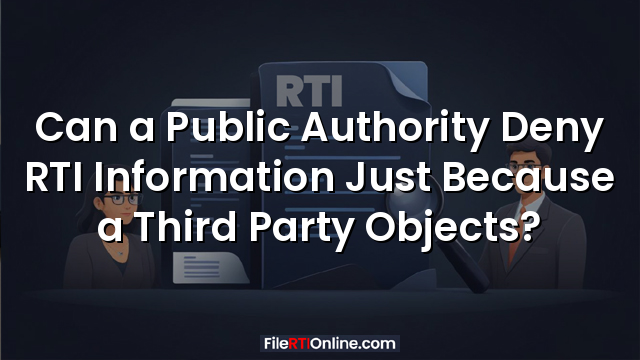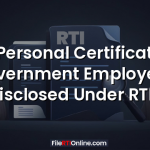Can a Public Authority Deny RTI Information Just Because a Third Party Objects?
Understanding When “Third-Party Information” Can Actually Be Denied Under RTI
Under the Right to Information (RTI) Act, many applicants face a common problem:
the Public Information Officer (PIO) refuses information simply because a third party objects.
But the law is very clear — a third party’s objection is NOT final, and the PIO is not bound to follow it blindly.
This article explains the rule in a broader perspective and uses a real case involving the Indian Bureau of Mines (IBM) as the example.
Can Third-Party Objection Automatically Stop Disclosure Under RTI?
No.
The PIO cannot deny information solely because a third party says “don’t give it.”
Section 11 of the RTI Act only requires the PIO to consult the third party, not to obey them.
The PIO must apply independent mind, interpret the RTI Act, and decide whether:
- the information is actually confidential
- the information falls under exemptions
- there is a larger public interest
Third-party objection does not override the RTI Act.
What Kind of Information Is Not Third-Party Information?
People often misunderstand what “third party” information means.
These types of information cannot be treated as confidential third-party information:
- Replies given to government show-cause notices
- Communications between a regulator and a regulated entity
- Documents filed as part of statutory compliance
- Information relating to environmental violations
- Actions taken authorities against private entities
Such information is part of statutory or regulatory proceedings, not private communication.
Use Case: IBM–Mining Company RTI Case
Background
A citizen requested from the Indian Bureau of Mines:
- A copy of a show-cause notice sent to a mining company
- The reply submitted company
- Information about mines in Nagpur region
The PIO denied information because the company objected.
CIC’s Findings
The Central Information Commission held:
- The reply to a show-cause notice is not confidential third-party data.
- It is part of a statutory process and not personal or private.
- The PIO must apply mind and cannot simply accept the company’s refusal.
- Third-party views can be “considered” but are not binding.
- Mining activities affect environment and public resources → public interest is high.
CIC’s Final Direction
The PIO must disclose the company’s reply and documents.
If he refuses, he must issue a speaking order explaining the legal justification.
Broader Conclusion: You Can Get Many Third-Party Related Records Under RTI
People commonly assume RTI cannot be used for anything involving private entities.
But that is not true.
You can get information relating to private parties when:
- The information is part of statutory processes
- Government has received or acted upon it
- It affects public resources (mining, pollution, land use, public funds)
- There is larger public interest
Examples of Information You Can Seek Even if It Involves Third Parties
- Replies to government notices or violations
- Inspection reports
- Penalty orders
- Environmental clearances
- Pollution data
- Show-cause notices & replies
- Details of illegal mining, encroachment, zoning violations
All these fall under government regulatory actions, not private secrets.
Final Takeaway
A third party cannot block disclosure under RTI simply .
The PIO must independently decide whether the information:
- Is truly confidential
- Falls under an RTI exemption
- Or must be disclosed in public interest
RTI is meant to promote transparency in government actions, including those involving private companies.


